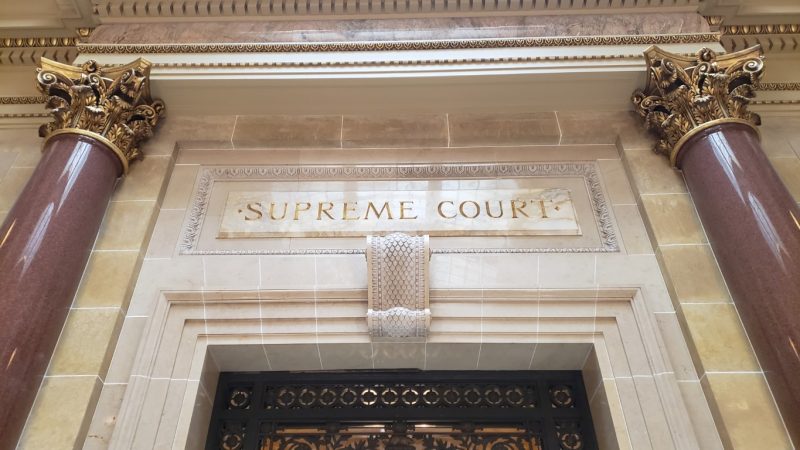A split state Supreme Court on Friday upheld Dem Gov. Tony Evers’ veto in the 2023-25 budget that wrote into state law for the next four centuries annual increases in how much schools can spend per student.
The 4-3 ruling by the liberal majority could dramatically shape upcoming budget deliberations with Republicans seeing the decision as an expansion of Evers’ already broad partial veto authority. Guvs can only exercise that spending power on appropriation bills, and Republicans warned the court’s ruling could embolden Evers to be more aggressive.
“This is a continuation of the liberal Supreme Court dismantling the Legislature as an equal branch of government,” said Joint Finance Committee Co-chair Mark Born, R-Beaver Dam. “The Legislature will continue to fight to represent our constituents despite Governor Evers’ constant efforts to usurp legislative authority.”
But Evers hailed the decision and called on GOP lawmakers to approve the $3.4 billion in new state funding he has approved for K-12 education. The Dem guv pointed to a string of referendums voters approved essentially raising their own property taxes. He said that was evidence Republicans have underfunded schools.
>> WisPolitics is now on the State Affairs network. Get custom keyword notifications, bill tracking and all WisPolitics content. Get the app or access via desktop.
“This decision is great news for Wisconsin’s kids and our public schools, who deserve sustainable, dependable, and spendable state support and investment,” Evers said. “For over a decade, the Legislature has failed to meet that important obligation. Importantly, this decision does not mean our work is done—far from it.”
The budget lawmakers sent to Evers in the previous two-year session called for a spending increase of $325 a year per student in both 2023-24 and 2024-25. Evers struck the “20” and a dash from the reference to “2024-25.” That changed the end date to “2425.”
Two taxpayers challenged the move with the backing of Wisconsin Manufacturers & Commerce, the state’s largest business group. Among other things, the suit argued Evers’ move was barred by a prohibition on guvs creating new words by striking out individual letters.
Justice Jill Karofsky, writing for the majority, found that the restriction — approved by voters in 1990 — applies “exclusively to the deletion of letters to create new words, not the deletion of digits to create new numbers.”
The lawsuit argued voters intended in the 1990 amendment that they approved to also bar the striking out of individual numbers because it is the same concept.
Joined by fellow liberals Ann Walsh Bradley, Rebecca Dallet and Janet Proatsiewicz, Karfosky rejected that reasoning, noting the amendment didn’t include the terms “digit” or “number.”
“We must give meaning to those omissions,” she wrote. “The only logical interpretation here is that the people of Wisconsin were prohibiting the deletion of letters to create new words.”
Conservative Justice Brian Hagedorn in his dissent ripped the majority ruling, writing it can’t be justified “under any reasonable reading of the Wisconsin Constitution.”
He bemoaned the court’s previous rulings on the partial veto, writing they allowed guvs to continue pushing the envelope with that power and when given “a clear opportunity in this case to reboot our mangled jurisprudence, the majority responds by blessing this constitutional monstrosity, all the while pretending its hands are tied.”
Joined by fellow conservatives Rebecca Bradley and Annette Ziegler, Hagedorn wrote the majority had allowed Evers to engage in lawmaking, which is the sole authority of the Legislature.
“The cases the majority relies on make a mockery of our constitutional order. This is a mess of this court’s making, and it is long past time for us to fix it,” he wrote.
During oral arguments in October, Karofsky expressed concerns the state Supreme Court has for too long broadly interpreted governors’ partial veto powers and that Evers’ 400-year veto was a bridge too far.
In today’s decision, she noted Evers’ veto was “both significant and attention-grabbing. However, our constitution does not limit the governor’s partial veto power based on how much or how little the partial vetoes change policy, even when that change is considerable.”
She also offered several suggestions to lawmakers, including addressing the guv’s veto in the upcoming 2025-27 budget or going to referendum again to further rein in his powers. GOP lawmakers already have an amendment working through the process that would bar guvs from using the authority to create or increase any tax or fee.”
Still, Senate Majority Leader Devin LeMahieu, R-Oostburg, and Assembly Speaker Robin Vos, R-Rochester, focused their attention on the court’s liberal majority. LeMahieu said the court ruled “based on partisanship and politics rather than the rule of law,” and fellow GOP lawmakers predicted the ruling would lead to massive property tax increases for the next 400 years.
The per pupil cap Evers reworked applies to what schools can spend between state aid and property taxes. In addition to the option of changing the language Evers wrote through future legislation, the amount of state aid put into the formula will heavily influence property taxes.
In his 2025-27 budget, Evers proposed tying the per-pupil spending increase to inflation going forward. Under his proposal, the limit would go up $334 in 2025-26 and $345 in 2026-27. The $3.4 billion in additional state spending on K-12 education he proposed in the budget would largely eat up that increase.
Vos called today’s ruling “a tortured reading of our Constitution that will hurt Wisconsin taxpayers for hundreds of years to come.”
“The Supreme Court’s partisan decision today should worry every Wisconsinite. The Governor can now raise property taxes – unchecked by any other branch of government – for hundreds of years,” he said.



